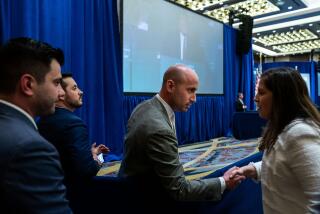For Minority Lawyers, It’s Who You Know, Bar Survey Suggests
- Share via
Minorities remain rare in partnership ranks at major U.S. law firms, largely because they have few contacts in white-dominated corporate suites--where the decisions about hiring lawyers are made, according to an American Bar Assn. survey to be released today.
Such lack of contacts gives the biggest law firms little incentive to diversify their partnership ranks and tends to discourage minorities from joining these firms, the survey organizers suggest.
In the survey, believed to be the first ever conducted of minority law partners, nearly half the respondents said lack of contacts and business networks outside their firms was the biggest impediment to building their practices. Nearly a quarter cited lack of such contacts within their firm as the major hurdle, and one-fifth said that “negative perceptions about minority lawyers” was the major impediment to their ability to generate new business.
Without business contacts on the outside and the mentoring and support network needed on the inside, minority lawyers fail to generate the numbers of clients and cases that are a key requirement of partnership and successive executive ranks within law firms, according to the survey.
Only 3% of partnerships at the country’s large corporate law firms are held by minorities, according to Bar Assn. figures. And while 60% of those responding to the survey said they generate as much or more legal business as other partners at their level, many say they do so without the help of the “old boys’ network” that continues to dominate partnerships at law firms and management ranks in Fortune 500 companies.
“It’s pretty widely felt that minority partners do not have the same access to corporate decision makers that their white male counterparts have,” said Karen Randall of the Los Angeles firm Katten, Muchin, Zavis & Weitzman. Last year, Randall was named co-managing partner of the firm, the first African American woman to reach such a position at a major U.S. law firm.
“It’s a cycle,” Randall said. “If minority partners are not able to generate the business to justify the position they’ve achieved in law firms, it has an impact on (that firm) recruiting other minorities and then on the number of minorities attending law school.”
The survey was conducted in October by the ABA’s Conference of Minority Partners in Majority/Corporate Law Firms. The 102 minority lawyers responding represent one-sixth of all African American, Latino, Asian American and Native American partners at major law firms. More than half said they were the first minority partners at their firms.
Marilyn Holifield, head of the minority partners conference, said that because of “the absence of overall expressed interest in using minority law partners by corporations and their legal departments, there remains little incentive for the larger law firms to diversify their partner ranks.”
Holifield said the ABA will ask major U.S. companies to “review and improve their procedures for involving minority law partners.”
While 83% of the survey respondents said they receive support from other partners at their firm, they also said just 30% of their client referrals are gained through that source.
Many white male lawyers develop the business contacts needed to generate billings at “country clubs and other more traditional connections that have not been accessible to minority partners as a group,” Randall said.
Also, partners “pick people who look like them to hand down their clients to, or to groom,” she said. Minority men, more than women, are the victims of this tendency because women lawyers often mentor other women lawyers regardless of ethnicity or race, Randall said.
She said these factors discourage minorities from joining large law firms. Katten, Muchin has 300 lawyers throughout the country.
Mario Camara, a partner at Cox, Castle & Nicholson in Los Angeles, said his “comfort level,” and not race or ethnicity, attracted him to that firm 21 years ago. A Latino graduate of the UCLA School of Law, Camara has been a partner at the 84-lawyer firm for 15 years.
He said large law firms seemed colder and he felt more insecure at them.
More to Read
Inside the business of entertainment
The Wide Shot brings you news, analysis and insights on everything from streaming wars to production — and what it all means for the future.
You may occasionally receive promotional content from the Los Angeles Times.










